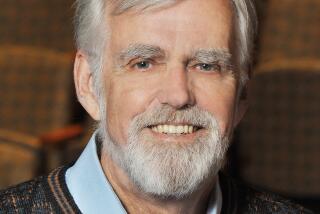Appreciation: Orson Bean’s emails to this critic reveal the chatty charm that made him so beloved
- Share via
As someone who knew Orson Bean mainly as a television personality on talk shows and game shows in the 1970s and ’80s, I have to admit I was surprised to discover as late as a few years ago just how good he could be onstage.
A seasoned veteran who had perfected the art of holding an audience rapt, he stole the show playing J. Trumbull Sykes, a grandiose English department chairman embroiled in a postmodern academic tussle in Steven Drukman’s “Death of the Author” at the Geffen Playhouse in 2014. I don’t remember much about the play, except that Bean filled the production with the electricity of an old pro given a role that needed as much personality as the stage could possibly hold.
It was ideal casting. Bean, who died Friday night at age 91 in Los Angeles after being hit by a car, had no trouble supplying the necessary flamboyance and fireworks. “This is a performance not to be missed,” I wrote, adding at the end of the review that “Trumbull is a scholarly Falstaff who deserves a comedy all his own.”
Occasionally, I’ll hear from an actor I have praised in print. Bean not only sent me an email to tell me what my words meant to him, he also kept up a correspondence that lasted until last fall when he wrote a note of appreciation in September for my review of the revival of the Gertrude Stein-Al Carmines musical “In Circles” at the Odyssey Theatre.
“I was afraid a critic might cover it who didn’t get it,” he wrote. “Eons ago, back in Al Carmines’ day I saw a show of his at Judson called ‘Home Movies.’ I loved it, remounted it and moved it to the Provincetown. … my one adventure as producer.”
Orson Bean of “Match Game” and “The Merv Griffin Show” (my earliest memories of him) produced a show by off-off-Broadway trailblazer Al Carmines? His career, of which I had been ignorant of whole swaths, only seemed to grow more unexpected the longer you knew him. (Did you know he was nominated for a Tony Award for his performance in “Subways Are for Sleeping”? Having missed his heyday on Broadway, I found out only a few years ago ago.)
In truth, there were things I didn’t want to know about, such as his columns for his son-in-law Andrew Breitbart’s website. But as a critic who judges performers by the work they do and as a human being who has a few conservatives in his own family, I had no interest in digging into these matters. Generous and entertaining in his personal exchanges, Bean made it easy to look the other way.
What’s more, he was too complex a figure for snap judgments. Like Zelig, he seemed destined to intersect with history. He had been blacklisted during the Cold War, a consequence, he said, not so much of politics but of sexual attraction. (He attended a couple of Communist Party meetings because of a pretty woman he wanted to date). His banter and wit drew the world to him, and he conversed his way past categories and differences. The local theater community, recognizing one of its own, adored him.
Bean had that quality that makes actors run: neediness. This is their fossil fuel, the source of energy driving them past their insecurities into the limelight, where momentarily they can feel safe and whole.
The title of one of his memoirs, “Too Much Is Not Enough,” reveals just how self-aware he was of his psychological makeup as a showman. I loved his solo piece “Safe at Home: An Evening With Orson Bean,” a theatrical portrait of an entertainer as a wounded young man, and he was so pleased with what I wrote he wanted me to attend it again and again and again. And would I perhaps consider writing another story?
His emails would occasionally plead, but he was just doing what he had been doing since he was a boy growing up in the Boston area with an unstable mother whose suicide left him with a burden of guilt. Bean was hustling for his survival in showbiz, relying on his wiles to keep his life raft afloat.
“Safe at Home” gave him a showcase to brandish the versatile talents he had honed over the years as a raconteur, joke teller and actor with a song-and-dance man’s heart. He owned the audience like an old trouper. That accumulation of experience before a paying public cannot be faked. The fruit is timing. Elaine Stritch had it. Milton Berle, whom I saw do a set that absolutely killed at the end of his career, had it. And at the Pacific Resident Theatre, an intimate venue in Venice, Bean, famous to everyone in attendance for his myriad TV cameos, showed he had it too. In spades.
He performed another show there with his wife, actress Alley Mills, called “Alright Then.” He sent me another email after the run was finished. I don’t think he’d mind if I shared it. He loved the spotlight, but even more than that, he loved connecting, which was in fact his true genius:
On April 18th Alley and I celebrated our 25th anniversary with one last performance of our two person show. We’d had a very successful run (by 99 seat standards) and I now look forward to celebrating my 90th birthday in a few weeks. It’s my intention to spend my dotage sitting in a rocking chair re-reading Dickens. (Though who knows. I just shot five wonderful scenes with Denzel Washington for a new movie which will come out in September.) It’s vain of me to send you the attached [link of] the show we did. But since it has come and gone and there’s nothing you can do to help, I thought I’d do so since I’m proud of it and you liked the first one. Hope you’re well and happy. Best, Orson.
More to Read
The biggest entertainment stories
Get our big stories about Hollywood, film, television, music, arts, culture and more right in your inbox as soon as they publish.
You may occasionally receive promotional content from the Los Angeles Times.











